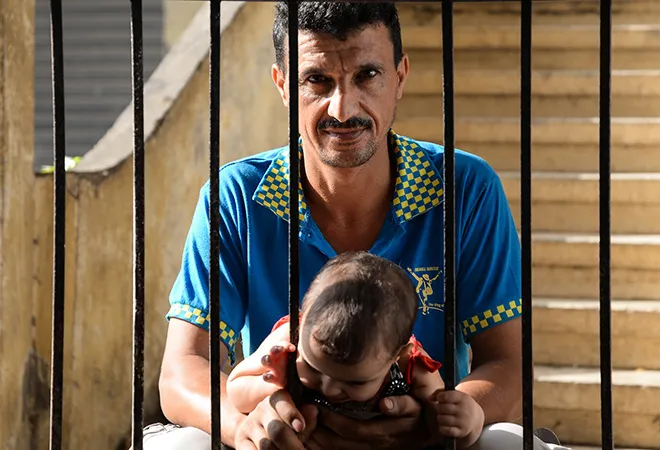
As the deadly reality of COVID19 descended on the western world, hash tag #StayAtHome trended on Twitter. Newswomen and men on major international networks brought epidemiologists on-air and repeated — stay indoors to stop the contraction, and, the spread of the virus.
However, in the refugee camps in West Asia sheltering millions of displaced Arabs, ‘Stay at Home’ was seen as an insensitive reminder of their homelessness. There is barely enough room to sleep in their cramped tents, forget social distancing. There is barely enough water to wash hands once, forget scrubbing for 20 seconds. In the conflict-ridden countries of West Asia, while everyone is hoping for the storm to pass before it destroys their already fragile economies, those displaced by war are the most vulnerable.
There is barely enough water to wash hands once, forget scrubbing for 20 seconds.
3.5 million Syrians shoved in a sliver of territory in the Idlib province and Aleppo countryside along the Turkish border have the worst to fear. The Syrian government and the Russian airplanes have destroyed major parts of the last rebel-held enclave and ferociously attacked the civilian infrastructure, including the schools, but especially the hospitals. The doctors here say that their preparations are woefully inadequate to deal with the epidemic. They fear at least a million people could be infected and a hundred thousand may die once the virus hits the region. There are just over 100 intensive care units, around 150 ventilators and no provision for sanitisers or facemasks.
Although no cases have yet been reported, the area is sandwiched between Turkey and Assad-controlled Syria, both of which have reported confirmed cases. Health experts worry it is only a matter of time before the virus invades the region and leaves many more dead than the Russian bombs.
The frequent onslaughts by Damascus and Moscow have pushed the displaced Syrians to often seek shelter in olive groves and unfinished buildings. Most of the others are packed in camps with their backs to a sealed Turkish border. Doctors say the area is primed for a quick spread of the virus.
The frequent onslaughts by Damascus and Moscow have pushed the displaced Syrians to often seek shelter in olive groves and unfinished buildings.
The World Health Organisation (WHO) has sent a few testing kits just last week to the Idlib health directorate, but the doctors are asking for many more. They say that no cases have been found because no one has yet been tested. The WHO has admitted that were the virus to spread to the camps, containing it would be a daunting task. The people in overcrowded camps, facing daily deprivations are already highly susceptible to respiratory infections.
Refugees in neighboring countries are not doing much better. In Lebanon, host to 1.5 million Syrians, the hospitals were under immense strain even before the COVID19 crisis. The country’s economy has been mishandled for decades, pushing it on the verge of collapse. The recent protests in Lebanon called for an overhaul of the political system with the hope that a new leadership would turn around the country’s economic situation, but instead the protests expedited the economic instability. The banks imposed capital controls, which eventually led to a steep fall in the value of Lebanese pound. As the currency plummeted, inflation rose and people found themselves spending much more on basic necessities. Since 2011, the government has failed to pay $1.3 billion it owes to several hospitals, according to one recent report by the Human Rights Watch. In addition, a shortage of dollars has limited the ability of the hospitals to import life-saving medicine.
Under such circumstances, with an already feeble healthcare sector, Lebanon has not even cared to pretend it is concerned about the refugees. Refugees in Lebanon fear that the healthcare authorities will not priorities them at a time when they are unable to help their own citizens. In the camps, people are also expressing anger towards the United Nation’s refugee agency, the UNHCR, complaining that it has not supplied sanitisers despite several requests. However, the UNHCR says it is doing all it can to help.
With an already feeble healthcare sector, Lebanon has not even cared to pretend it is concerned about the refugees.
Turkey is providing refuge to three million Syrians who fled the war. They are scattered all over — renting flats, languishing in empty buildings and in camps. Many of them are worried about the economic fallout of the COVID19 containment. As the factories and shops providing them infrequent yet some form of employment as daily laborers shut down, the refugees have little to feed their families. Their priority, they say, is to buy bread before sanitisers.
Jordan has taken severe measures and placed the two camps that host about a hundred thousand Syrian refugees in a lockdown. Some camps in Lebanon and Turkey have imposed self-quarantines and decided to restrict the movement, especially of the elderly. But Syrian refugees in all of these countries say they still need the aid workers to help and allege that the aid workers are reluctant to venture in. The aid agencies say they have limited visits to the camps only to protect the refugees.
To surmise, it’s a pretty grim picture in the refugee camps and displacement sites that have become home to millions of war-afflicted Syrians. While NGOs have started to collect funds to supply hygiene kits, a massive global effort would be required to save the refugees from COVID19, if it indeed hits the camps. A few cases could turn the encampments into a graveyard. The global health organisations and the international community still has time to prepare and plan, but whether they will do so on time is another question.
The views expressed above belong to the author(s). ORF research and analyses now available on Telegram! Click here to access our curated content — blogs, longforms and interviews.




 PREV
PREV


